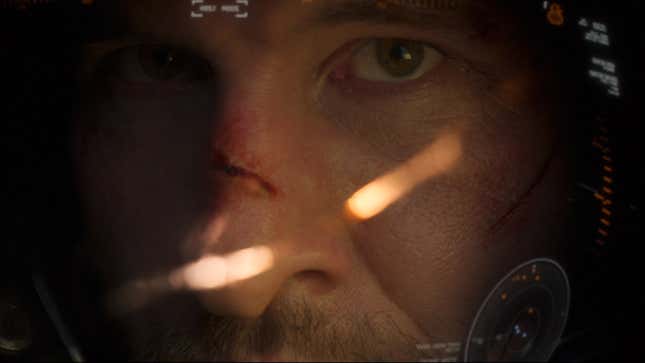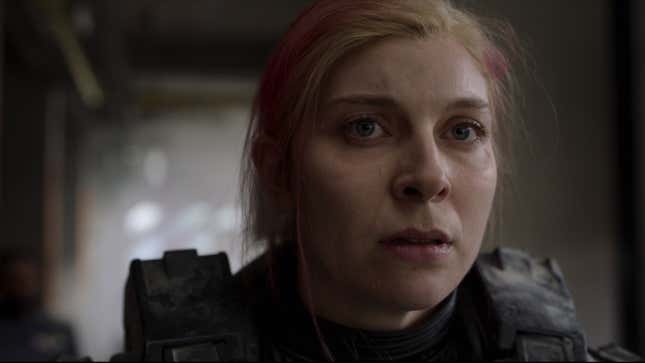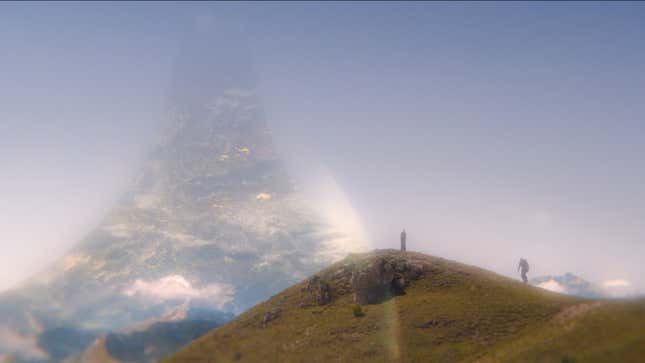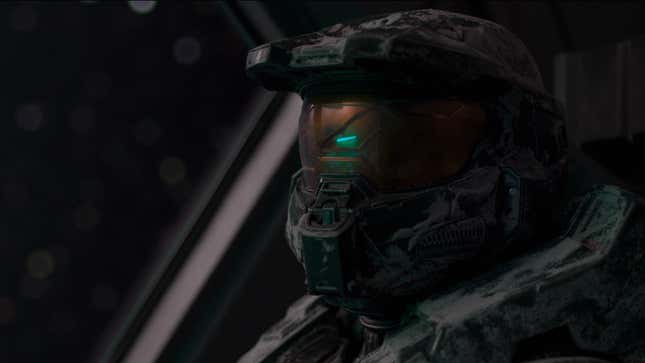
With “Transcendence,” the ninth and final episode of the Halo show’s premiere season, a lot is uncertain. This show has been a giant experiment of taking a “spaghettified” collection of Halo games, books, comics, and other related media and funneling that into an on-screen adaptation firmly rooted in the tradition of prestige fantasy/sci-fi television that arguably reached critical mass with Game of Thrones. And with the first season now over, I think the show largely succeeded despite some poor executions of otherwise perfectly entertaining and engaging plot developments, most of which are undeniably congruent with the stories Halo has been telling since 2001.
The problem, of course, is that what makes Halo “Halo” is easily confused and hotly contested. Let’s be honest, Halo began as a fairly straightforward shooter steeped in the tradition of military science like Starship Troopers and Alien, among others. The story, at least in the original trilogy, was an of-its-era post-9/11 tale of a military industrial complex tasked with defending “humanity” against religious zealots.
After the departure of Bungie in the early 2010s, the series adopted grander ambitions and tried to take itself more seriously. I believe this show is the culmination of that effort and is, when it wants to be, one of the series’ better attempts at achieving a broader scope of storytelling. Contention over when Halo lost what made it “unique” is more debated in community spaces than the authenticity of Metallica albums post-1991, so any conversation about this show, the books, or the games since Halo 4 is a fruitless exercise in arguing against nostalgia and very specifically curated sets of opinions. And I am not immune from that either.
All of that said, this show seems invested in adapting the themes from other Halo media into an interesting reconfiguration while keeping the mythos thematically on track…albeit with the whole affair feeling like it’s perhaps teetering on the brink of collapse.

If nothing else, “Transcendence” proved a couple things. First off, that the Halo show is, inheritance aside, just plain old fun television sci-fi. Sometimes it gets awkward, other times it sings—I mean, a show that talks about one’s identity being recovered through a change of hormone regulation, while bonding through found family over a history of childhood trauma, is of course going to make me, a trans woman, feel a certain way. For all of the talk of humanity being central to this show, I think the season finale makes it undeniable: This is a story about people.

While its portrayal of a military industrial complex still requires a deeper conversation, it’s clear that these characters need one another as they struggle to hold on to their humanity by coming together in the face of a fucked-up situation. As such, I’m genuinely glad no Spartans died here, and that last episode’s explosive conflict between them didn’t lead to them murdering one another.
Though John is the “chosen one”-style protagonist, he still needs to rely on others, be that Cortana or the other Spartans. He may be the hero, but we’re getting a better sense of who he’s a hero to in this episode. Keeping these characters alive, I think, has allowed the collective heroism these characters share to take center stage. With that, the show has proven why they need to take off their helmets so often: Their past and present situations demand and enforce the helmet, the suit, the role of the soldier, but these are people who are, one might say, heroically struggling against that demand. Whether they’ll survive and be able to secure a future in which they don’t need the armor, metaphorically at least, remains to be seen.
As for the show’s larger movements in the Halo mythos, events are very interesting and, I want to cautiously say, promising. While I’ve enjoyed most of this season, I’ve also caught myself saying aloud, “When the fuck are they gonna get to the damn Halo ring?” “When is Reach gonna get glassed?” “Why can’t Kwan’s screen time make the most of the intriguing plot elements surrounding her?”
I actually think its slow reveal of secrets might be for the better, though.

The season’s slow drip-feed and reliance on a set of annoying “keystone” artifacts—which always seem to be able to deescalate out-of-control action in a very narratively convenient way—has been tiring but, if the story of Halo is one of uncovering some of the deepest secrets of our universe, maybe it’s appropriate that meaty lore is well hidden. Reveal the deepest secrets of the cosmos too fast, and it makes the people in this world look kinda stupid for not figuring them out sooner. Hold them back too much and you end up with a J.J. Abrams production. I think this season finale mostly achieves that balance, and it’s earned us time with these characters. But it’s clearly worn out. Season two needs to kick it up a few notches and get to the damn chorus.
Now, did Makee need to die for that? I think the story is going to wrestle with that for some time, and she’ll possibly become a bit like Halo 4/5's version of Cortana for Chief. Do we need another narrative with a big, burly, straight white guy being upset over a woman dying? Most definitely not. But this can serve as a good enough counterpoint to John’s internal sense of himself as a hero; let’s just hope it doesn’t turn him into a version of Final Fantasy VII: Advent Children’s Cloud Strife and see him mope about for another bunch of episodes.
That’s assuming John is even still with us.

The fate of John is seriously uncertain. Without another couple of close readings of what was said and what happened by the end of this last episode, it’s hard to say “where” John is. I’m not entirely sure if Cortana did take over? Is he just stoically upset over his girlfriend getting shot? I don’t know! It’s thematically appropriate, however, for us to see John fade behind the helmet of the Master Chief, to become the mindless soldier the story (and most fans...) want or need him to be. While many viewers haven’t been happy about the show having so many helmless, suitless scenes, we at least got to see who is now potentially lost, instead of the plot just telling us that his humanity is at risk, which is what the games and books have mostly settled for.
“Wake up, John,” was a central theme in Halo 4's marketing and story, the hero fading into a slumber and being summoned when he’s needed. The first game begins with this theme, and it’s how the original trilogy ended. Halo has, in its greater context, been about cycles of civilization and conflict throughout history, with heroes playing pivotal roles rising and falling over the eons. Who they are, where they are, and “when” they are is often what makes the difference, and that the show is playing with this, I think, is what arguably makes it a true Halo adaptation and not merely the style of the games set to a different tune.
That said, this season has struggled to juggle its many plot threads, one of which it ended with a bullet through Makee. Between the Keyes family drama, the Ha family secrets, Soren, Catherine Halsey’s bullshit, and all of the Spartan stuff, there’s so much on the table that I’m not sure the show can give it all the care it deserves, as we saw with Kwan’s scenes amounting to little more than her just repeating the same lines over and over and getting mad at everyone. It almost felt as if the character herself was breaking the fourth wall and demanding better pacing and writing. We’re bound to see some of these current stories fade away or take strange turns, as we did, for example, in Battlestar Galactica and Fringe.
Now that the location of the Halo rings has been revealed (I think?) it will be interesting to see where season two takes this source material and these narratives. And I think the most interesting aspect of the experiment that is the Halo show, at least for me, is that I’ve come to be entertained enough by this collection of nine episodes to want to see where they go with it. The actors are a good fit and the show’s adapting the themes well enough for the format. It’s just a question of whether it can reach the mythos’ larger story beats in any sort of satisfying manner. And from the looks of things, the answer to that question might be much further out than we would wish.